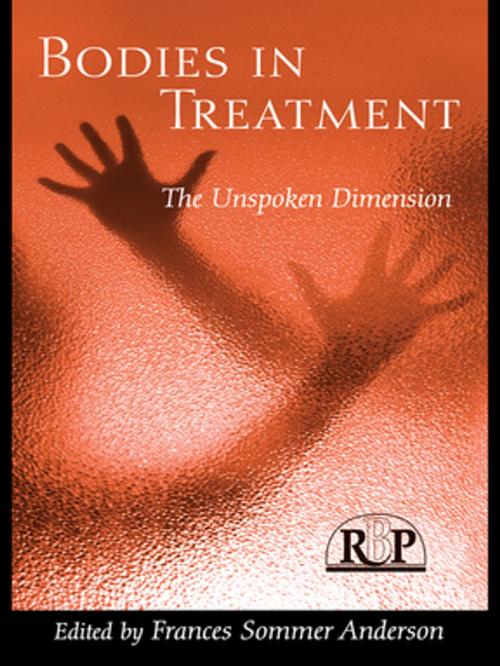Bodies In Treatment
The Unspoken Dimension
Nonfiction, Health & Well Being, Psychology, Applied Psychology, Psychotherapy, Mental Health| Author: | ISBN: | 9781136823060 | |
| Publisher: | Taylor and Francis | Publication: | March 1, 2013 |
| Imprint: | Routledge | Language: | English |
| Author: | |
| ISBN: | 9781136823060 |
| Publisher: | Taylor and Francis |
| Publication: | March 1, 2013 |
| Imprint: | Routledge |
| Language: | English |
Bodies in Treatment is a challenging volume that brings into conceptual focus an "unspoken dimension" of clinical work - the body and nonverbal communication - that has long occupied the shadowy realm of tacit knowledge. By bringing visceral, sensory, and imagistic modes of emotional processing to the forefront, Editor Frances Sommer Anderson and the contributors to this original collection expand the domain of psychodynamic engagement. Working at the leading edge of psychoanalytic theory and practice, and in the forefront of the integrative psychotherapy movement, Anderson has created a collaborative project that stimulates interdisciplinary dialogue on the developmental neurobiology of attachment, the micro-processing of interchanges between the infant and caregiver, the neuroscience of emotional processing and trauma, body-focused talking treatments for trauma, and research in cognitive science.
Enlightened by experiencing body-based treatments for thirty years, Anderson reflects on the powerful impact of these interventions, recounting attempts to integrate her somatically-informed discoveries into the "talking" frame. Reaching further, her contributors present richly informative accounts of how experiences in body-based modalities can be creatively integrated into a psychoanalytic framework of treatment. Readers are introduced to specialized modalities, such as craniosacral therapy and polarity therapy, as well as to the adjunctive use of yoga, the effectiveness of which can be grounded neurophysiologically. Somatic interventions are discussed in terms of the extent to which they can promote depth-psychological change outside the psychoanalytic consulting room as well as how they can enrich the relational process in psychodynamic treatment. The final sections of Bodies in Treatment explore the range of ways in which patients’ and therapists’ bodies engage, sustain, and contain the dynamics of treatment.
Bodies in Treatment is a challenging volume that brings into conceptual focus an "unspoken dimension" of clinical work - the body and nonverbal communication - that has long occupied the shadowy realm of tacit knowledge. By bringing visceral, sensory, and imagistic modes of emotional processing to the forefront, Editor Frances Sommer Anderson and the contributors to this original collection expand the domain of psychodynamic engagement. Working at the leading edge of psychoanalytic theory and practice, and in the forefront of the integrative psychotherapy movement, Anderson has created a collaborative project that stimulates interdisciplinary dialogue on the developmental neurobiology of attachment, the micro-processing of interchanges between the infant and caregiver, the neuroscience of emotional processing and trauma, body-focused talking treatments for trauma, and research in cognitive science.
Enlightened by experiencing body-based treatments for thirty years, Anderson reflects on the powerful impact of these interventions, recounting attempts to integrate her somatically-informed discoveries into the "talking" frame. Reaching further, her contributors present richly informative accounts of how experiences in body-based modalities can be creatively integrated into a psychoanalytic framework of treatment. Readers are introduced to specialized modalities, such as craniosacral therapy and polarity therapy, as well as to the adjunctive use of yoga, the effectiveness of which can be grounded neurophysiologically. Somatic interventions are discussed in terms of the extent to which they can promote depth-psychological change outside the psychoanalytic consulting room as well as how they can enrich the relational process in psychodynamic treatment. The final sections of Bodies in Treatment explore the range of ways in which patients’ and therapists’ bodies engage, sustain, and contain the dynamics of treatment.















